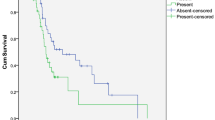Abstract
PURPOSE: Mutations in K-ras andTP53 genes are common in colorectal cancer. They affect biologic behavior and might influence chemotherapy susceptibility in these tumors. We investigated whether the survival of patients with Dukes C colon cancer treated with adjuvant chemotherapy is influenced by K-ras andTP53 mutations. METHODS: Mutation screening of the hot spots of the K-ras gene and of the evolutionarily conserved regions of theTP53 gene was performed by denaturing gradient gel electrophoresis technique in formalin-fixed paraffin-embedded specimens of 55 consecutive patients with Dukes C colon cancer treated with adjuvant 5-fluorouracil-based chemotherapy. The median follow-up was 47 (range, 32–66) months. RESULTS: Alterations in the mutation hot spots of K-ras were found at codon 12 (n=11) and 13 (n=4) in 15 of the 55 carcinomas (27 percent). No mutation was found at codon 61. Mutations of a probably causative nature in the evolutionarily conserved regions (exons 5–8) of theTP53 gene were found in 24 tumors (44 percent). K-ras andTP53 mutations were found equally in the group with recurrent disease (7/26 (26 percent) and 12/27 (44 percent), respectively) and in the group without recurrences (8/28 (24 percent) and 12/28 (43 percent), respectively). Cancer-specific survival did not differ significantly between patients with K-ras orTP53 or both mutated and nonmutated tumors, respectively (log-rank test: K-ras, P=0.72 andTP53, P=0.77; K-ras andTP53, P=0.8). Also, potentially aggressive K-ras codon 12 and 13 mutations had the same survival as tumors without these mutations (log-rank test;P=0.73). CONCLUSIONS: Patients with K-ras orTP53 or both mutated Dukes C colon tumors have the same survival as nonmutated tumors when treated with adjuvant chemotherapy. These data suggest that mutations in K-ras orTP53 alone are not prognostic indicators in patients with Dukes C colon cancer receiving adjuvant 5-Fluorouracil-based therapy.
Similar content being viewed by others
References
Moertel CG, Fleming TR, Macdonald JS,et al. Levamisole and fluorouracil for adjuvant therapy of resected colon carcinoma. N Engl J Med 1990;322:352–8.
Moertel CG, Fleming TR, Macdonald JS,et al. Fluorouracil plus levamisole as effective adjuvant therapy after resection of stage III colon carcinoma: a final report. Ann Intern Med 1995;122:321–6.
Finkelstein SD, Sayegh R, Bakker A, Swalsky P. Determination of tumor aggressiveness in colorectal cancer by K-ras-2 analysis. Arch Surg 1993;128:526–31.
Bell SM, Scott N, Cross D,et al. Prognostic value of p53 overexpression and c-Ki-ras gene mutations in colorectal cancer. Gastroenterology 1993;104:57–64.
Finkelstein SD, Sayegh R, Christensen S, Swalsky PA. Genotypic classification of colorectal adenocarcinoma. Biologic behavior correlates with K-ras-2 mutation type. Cancer 1993;71:3827–38.
Morrin M, Kelly M, Barrett N, Delaney P. Mutations of Ki-ras and P53 genes in colorectal cancer and their prognostic significance. Gut 1994;35:1627–31.
Pricolo VE, Finkelstein SD, Wu TT,et al. Prognostic value of TP53 and K-ras-2 mutational analysis in stage III carcinoma of the colon. Am J Surg 1996;171:41–6.
Lenz HJ, Danenberg KD, Leichman CG. p53 status and thymidylate synthase levels are predictors of chemotherapy efficacy in patients with advanced colorectal cancers [abstract]. Proc Am Soc Clin Oncol 1996;216:504.
Niimi S, Nakagawa K, Yokota J,et al. Resistance to anticancer drugs in NIH3T3 cells transfected with c-myc and/or c-H-ras genes. Br J Cancer 1991;63:237–41.
Lowe SW, Bodis S, McClatchey A,et al. p53 status and the efficiency of cancer therapy in vivo. Science 1994;266:807–10.
Stein A, Raoult D. A simple method for amplification of DNA from paraffin-embedded tissue. Nucleic Acids Res 1992;20:5237–8.
Hayes VM, Bleeker W, Verlind E,et al. Comprehensive TP53-denaturing gradient gel electrophoresis mutation detection assay also applicable to archival paraffin-embedded tissue. Diagn Mol Pathol 1999;8:2–10.
Hayes VM, Westra JL, Verlind E,et al. New comprehensive denaturing-gradient-gel-electrophoresis assay for KRAS mutation detection applied to paraffin-embedded tumours. Genes Chromosomes Cancer 2000;29:309–14.
Bleeker WA, Mulder NH, Hermans J, Otter R, Plukker JT. The addition of low-dose leucovorin to the combination of 5-fluorouracil- levamisole does not improve survival in the adjuvant treatment of Dukes' C colon cancer. IKN Colon Trial Group. Ann Oncol 2000;11:547–52.
Hamelin R, Laurent-Puig P, Olschwang S. Association of p53 mutations with short survival in colorectal cancer. Gastroenterology 1994;106:42–8.
Goh HS, Yao TJ, Smith DR. p53 point mutations and survival in colorectal cancer patients. Cancer Res 1995;55:5217–21.
Smith DR, Ji CY, Goh HS. Prognostic significance of p53 overexpression and mutation in colorectal adenocarcinomas. Br J Cancer 1996;74:216–23.
Kressner U, Inganas M, Byding S. Prognostic value of p53 genetic changes in colorectal cancer. J Clin Oncol 1999;17:593–9.
Lenz HJ, Danenberg KD, Danenberg PV. p53 status and thymidylate synthase (ts) expression are associated and predict for recurrence in patients with stage II colon cancer [abstract]. Proc Am Soc Clin Oncol 1996;215:501.
Moerkerk PT, Arends JW, van Driel M,et al. Type and number of Ki-ras point mutations related to stage of human colorectal cancer. Cancer Res 1994;54:3376–8.
Ahnen DJ, Feigl P, Quan G. Ki-ras mutations and p53 overexpression predict the clinical behavior of colorectal cancer: a Southwest Oncology Group Study. Cancer Res 1998;58:1149–58.
Andreyev HJ, Tilsed JV, Cunningham D. K-ras mutations in patients with early colorectal cancers. Gut 1997;41:323–9.
Bosari S, Viale G, Bossi P,et al. Cytoplasmic accumulation of p53 protein: an independent prognostic indicator in colorectal adenocarcinomas. J Natl Cancer Inst 1994;86:681–7.
Hollstein M, Sidransky D, Vogelstein B, Harris CC. p53 mutations in human cancers. Science 1991;253:49–53.
Author information
Authors and Affiliations
Additional information
Supported by a grant form the Netherlands Cancer Foundation (NKB/KWF).
About this article
Cite this article
Bleeker, W.A., Hayes, V.M., Karrenbeld, A. et al. Prognostic significance of K-ras andTP53 mutations in the role of adjuvant chemotherapy on survival in patients with dukes C colon cancer. Dis Colon Rectum 44, 358–363 (2001). https://doi.org/10.1007/BF02234733
Issue Date:
DOI: https://doi.org/10.1007/BF02234733




